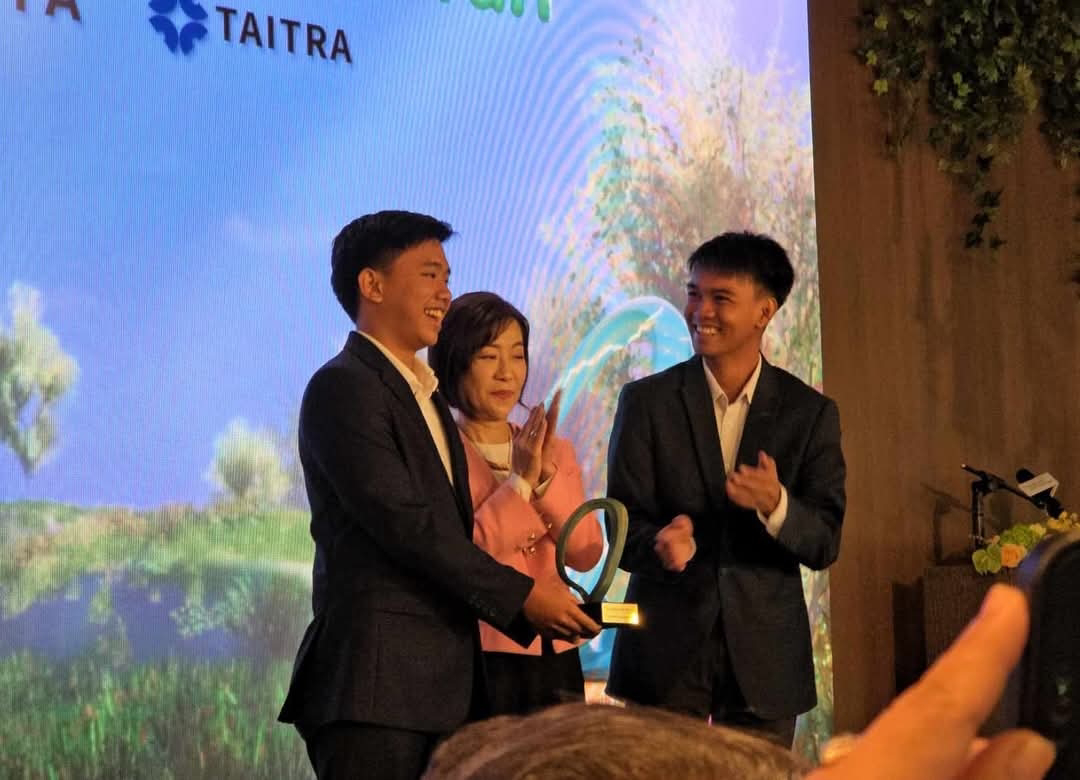By Leo Udtohan
For their innovative ideas on how to achieve environmental sustainability amidst progress and technological advancement, two students of Silliman University in Dumaguete City were declared winners in the "Go Green Taiwan" held in Taipe, Taiwan.
Dignity Lagunay and John Edison Tubil, 4th year and 3rd year marketing students of Silliman’s College of Business Administration received the award after presenting their entry before a panel of judges in the final round at the Taipe International Convention Center on Tuesday, Dec. 10.
Both 21 years old, Lagunay hails from Tagbilaran City, Bohol, while Tubil is from Dapitan City. They were accompanied by their adviser, Assistant Professor Lou Shien Ban Granaderos.
"It feels surreal that two provincial boys from the Philippines competed on the global stage, going head-to-head with 396 proposals from 45 countries—including companies and startups from Europe and North America—and emerged as Global Winners of the contest," said Lagunay.
He added," This victory has strengthened our resolve and given us hope that we can take tangible steps toward solving our country’s plastic problem. "
They received a cash prize of US$ 20,000.
"The team will proceed with the next steps to actualize the project by creating a start-up company. Majority of the cash prize will be allocated to inject capital into the start-up and for specific activities, including meetings, traveling to meet investors, and other related tasks," Lagunay said.
The duo engaged with industry leaders from the sugar and energy sectors and sought guidance through consultations with experienced mentors.
The Go Green with Taiwan global proposal campaign is organized by the International Trade Administration (TITA) under the Ministry of Economic Affairs (MOEA), and implemented by the Taiwan External Trade Development Council (TAITRA).
According to TAITRA, the campaign seeks proposals that focus on using Taiwan’s green products and solutions, or on fostering cooperation to achieve environmental and economic sustainability.
Six finalists made it to the final round coming from Ukraine, Canada, Hungary, United Kingdom, and the Philippines.
Lagunay and Tubil, who are members of the Silliman University Junior Marketing Association, were the sole representatives from the Philippines. Their entry was selected from among 396 proposals from 45 countries. Seventeen entries were selected in the semi-final round and 6 entries were shortlisted for the finals from which the top 3 would be declared global winners.
The announcement of winners took place on December 11 at the 1915 Nizukuriba with trophies presented by TAITRA President Simon Wang and TITA Director General Cynthia Wang.
Their entry "Sweet Solutions to the Plastic Crisis: Compostable Sugarcane-Based Alternatives" is prompted by the severe plastic crisis the Philippines is facing.
Their proposal aims to address the plastic crisis by fostering technological cooperation between Taiwan and the Philippines. Central to this initiative is JuTien Cleantech Co., Ltd., a Taiwan Excellence Award-winning company specializing in 100 percent compostable packaging made from sugarcane bagasse. Using their patented technology, JuTien transforms agricultural waste, such as sugarcane bagasse—a fibrous byproduct of sugar production—into processable particle materials that can be used to manufacture compostable, non-toxic bagasse cups, straws, lids, and bags.
Negros Island is known as the sugar island of the Philippines producing more than half of the country’s sugar and being home to more than half of the country’s sugar mills. In the period 2020-2021, Negros Island alone produced 4.7 million tonnes of bagasse.
The Ellen MacArthur Foundation warns that by 2050, there could be more plastic than fish in the ocean. The Philippines contributes to this crisis by leaking plastic into the West Philippine Sea, a vital region rich in marine resources that support fisherfolk across Asean countries.
According to the World Bank, the country generates 2.7 million tonnes of plastic waste annually, with 1.8 million tonnes leaking into the oceans. This alarming figure makes the Philippines the world's largest source of plastic pollution.
* * *
Thanks for your letters, all will be answered. Comments welcome at leoudtohan@yahoo.com, follow leoudtohanINQ at Twitter /Facebook/Instagram.

No comments:
Post a Comment